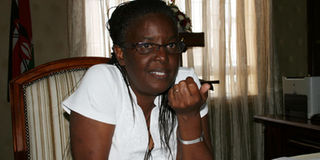IDPs who fled to Uganda now ‘on their own’

Special Programmes minister Esther Murugi. Photo/FILE
What you need to know:
- Minister Murugi says the group’s conditions for their return will not be met by government
About 300 internally displaced persons who recently fled to Uganda have issued a raft of demands which the government cannot meet, a minister disclosed on Wednesday.
Speaking in Nairobi, Special Programmes minister Esther Murugi said the IDPs — who are among some of the 2007/2008 post-election violence victims — are demanding that the government allocates each of them five acres, Sh500,000, a bicycle and pay school fees for their children before they return to Kenya. (READ: Refugees set conditions for return)
“These demands cannot be met by the government...In any case, since they left local camps voluntarily and fled to Uganda, they are no longer IDPs but refugees and their plight can only be addressed by the United Nations High Commissioner for refugees,” Ms Murugi said.
More fleeing
Fielding questions from journalists, the minister said her ministry was aware that some IDPs living in a camp at Kibera, Nairobi, were also heading to Uganda even after the government gave each of them Sh10,000.
She said the number of IDPs displaced during post-election violence stood at 350,000 and her ministry would soon table a Bill in Parliament that will enable the government to profile the exact number of those displaced.
Asked if the Sh1.8 billion budgetary allocation for purchase of farms for the IDPs was adequate, the minister said the matter was vested in the Ministry of Lands.
Earlier, Ms Murugi had flagged-off 30 lorries and 10 water bowsers worth Sh430 million which had been handed over by acting Japanese ambassador to Kenya Yoichiro Yamada at a ceremony at Uhuru Park, Nairobi.
The lorries will be used in transporting relief food supplies to drought-stricken areas while the water bowsers will be used in areas with perennial water shortage.
“Two thirds of our country is either arid or semi-arid which is prone to frequent droughts. As a result, some of our people are unable to produce food due to harsh climatic conditions while others are unable to access food due to their low purchasing power,” Ms Murugi, who was flanked by permanent secretary Andrew Mondo, said.
She said a consignment of vehicles, water treatment plants, speedboats, metal and concrete cutters and fire engines was expected from the Japanese Government.
On his part, Mr Yamada said his government had released $110 million (Sh9.4 billion) to Kenya since the beginning of this year for various projects to address drought, including food aid, water projects, health and shelter.
“We cannot stop drought or floods occurring, but we can reduce their impact on the affected countries...We can strengthen resilience to natural disasters by improving preparedness and we therefore welcome Kenya’s establishment of the national drought management authority.”
Mr Yamada said there was a need to improve water management systems, and to increase forest cover in the five water towers.




